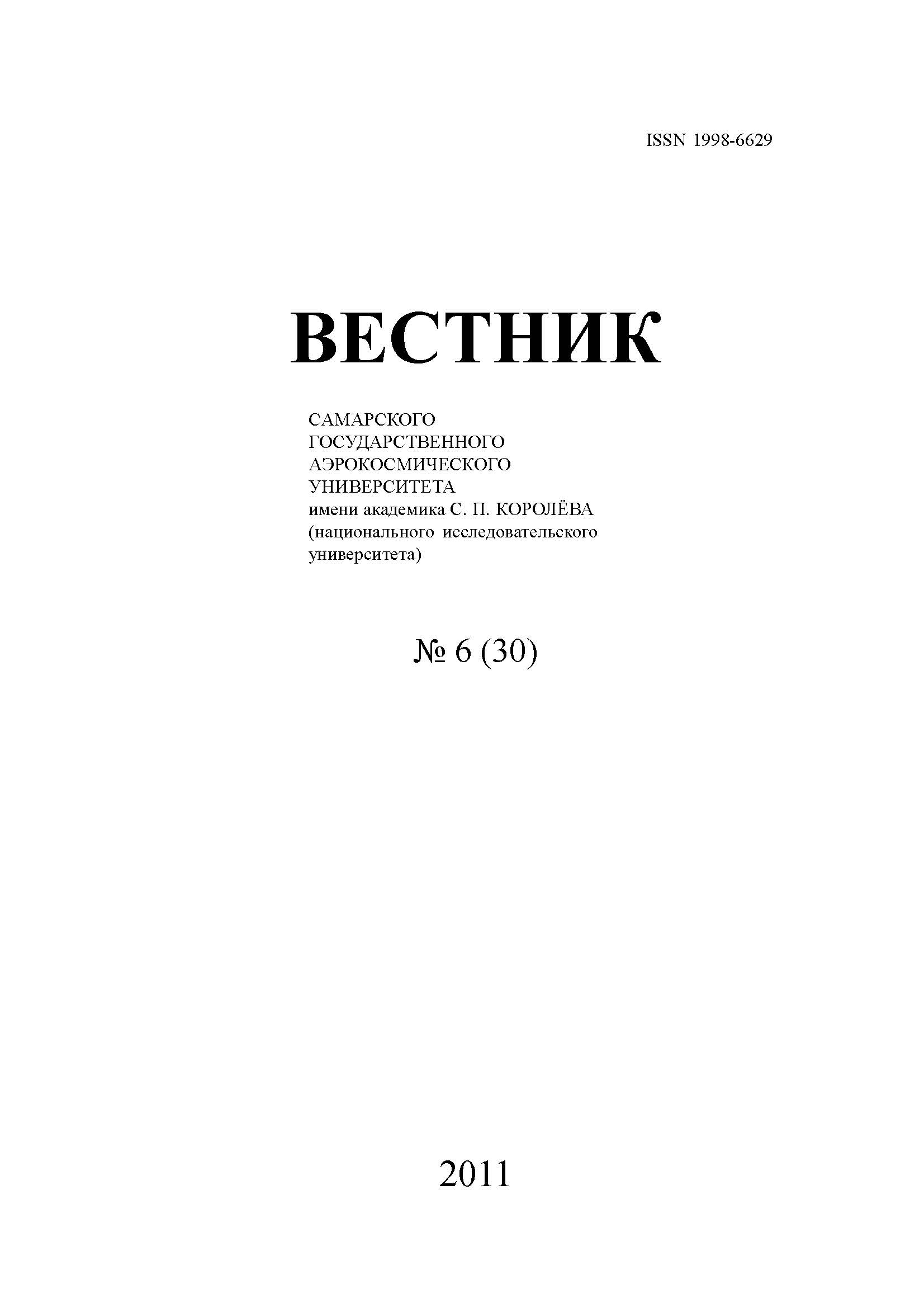Vol 10, No 6 (2011)
AIRCRAFT AND SPACE ROCKET ENGINEERING
Motion of an upper stage rocket with a toroidal tank around the mass center in parameters of Cayley-Klein
Abstract
The paper presents a mathematical model of motion of an upper-stage rocket with a toroidal tank filled with liquid fuel around the centre of mass. Time dependencies of motion parameters are established using a numerical and an analytical method. Limiting cases of orientation in Eulerian angles are analyzed.
 9-14
9-14


Nominal motion control program in a supersonic carrier aircraft
Abstract
A nominal program is suggested for controlling the aerodynamic lift coefficient in a supersonic carrier aircraft as the first stage of an aircraft-space system. The finite motion conditions at the given slope of the flight path are defined.
 15-21
15-21


Experimental investigation of the efficiency of laserelectronic systems for aircraft surface remote sounding
Abstract
Experimental studies to define the reflection characteristics of aircraft surfaces have been carried out. The behavior of the reflectance under pulse periodic action with different values of intensity has been analysed. A test-bed for laser detection and ranging of objects is used to analyse the influence of sounding laser radiation parameters on the probability of detection and recognition. Relationships between the image contrast range and the impulse angle of incidence, wavelength and relative pulse duration have been obtained. Experimental estimation of the influence of the radiation wavelength on the probability of detecting objects in case of using lasers has been carried out.
 22-30
22-30


Estimation of the required thrust impulse for small spacecraft (SSC) control system with a propulsion system using fuel gas components
Abstract
The subject of research is a small weight and size spacecraft (LSC) equipped with a perspective oxygenhydrogen propulsion system on the basis of water electrolysis and low thrust engine (LTE) using H2Г+O2Г gas components. Estimation of the required thrust impulse for performing of LSC transition maneuver from the injection to the working orbit, correction of the orbital altitude and LSC submersion maneuver in the target area of the World ocean is presented. Numerical values of thrust impulse estimation for the given inertial-mass parameters of LSC are given.
 31-38
31-38


Developing a problem-oriented system for automated design of observation space vehicles capable of interacting with a PDM-system
Abstract
The paper deals with the problem of developing problem-oriented systems for automated solution of space vehicle design tasks. The paper presents an algorithm for testing the tasks for correctness and a method of defining the sequence of performing calculations, subsequently obtaining the numerical values of the required parameters for the space vehicle airborne systems. The problem of obtaining numerical values of mass and dimensional characteristics of the space vehicle as a whole is discussed. The software developed in the DELPHI XE environment for solving the tasks set is described. The possibility of integrating the problem-oriented system with a system of product data management (PDM-system) is analysed.
 39-46
39-46


MECHANICAL ENGINEERING
Calculation of vibroacoustic characteristics of a four-point ball bearing. Part 2
Abstract
The paper presents the results of the calculation of noisiness of a four-point bearing depending on the accuracy of producing as a part of the product in which it works. The calculation was performed according to the methods and programs developed by the authors. The noisiness of the separator and the balls that exists when the bearing is placed in any kind of an elastic system is calculated. Natural frequencies of bearing elements are defined with a given load on it as applied to the vibration set. It is shown that the errors of bearing production result in parametric excitation of elastic systems and excite oscillations with natural frequencies in them which produce the greater part of noisiness both of the systems and the bearings.
 123-130
123-130


INFORMATION SCIENCE, COMPUTING TECHNOLOGY AND CONTROL
Probability-based genetic algorithm for solving complex multiobjective optimization tasks using adaptive mutation operator and Pareto set prediction
Abstract
The article is devoted to a new algorithm for solving complex constrained multiobjective optimization tasks on the basis of probability-based GA. An efficient modification of the algorithm using adaptive mutation and Pareto set prediction is proposed. The results of efficiency investigation are presented.
 273-282
273-282


MECHANICAL ENGINEERING AND POWER ENGINEERING
Nondestructive quality control of mechanical-rubber goods vulcanization
Abstract
A new method of nondestructive quality control of mechanical-rubber goods vulcanization is suggested. The method is based on the measurement of rubber electric resistance to direct and alternating current during vulcanization
 47-52
47-52


Mathematical simulation of combined technologies
Abstract
A research founded procedure of new technology combining the advantages of traditional ways of executing operations and high-speed magnetic-impulse action is proposed the seaming operation optimization
 53-59
53-59


Using the theory of dynamic analogies for modelling automated manufacturing systems
Abstract
The paper presents a method of modeling up-to-date hydraulic complexes on the basis of using the theory of dynamic analogies. An algorithm of modeling the state of a hydraulic system on the basis of working fluid parameters is described.
 60-66
60-66


Experimental research of combined technology for parts assembly
Abstract
Propose a new combined technology of implementation of the processes and assembling of sheet-metal forming stamping which includes combining static and dynamic loads without stopping the process. The advantage of this technology over the traditional methods and the possibility of its implementation in the production of facing parts of the vehicle.
 67-72
67-72


Mathematical model of anisotropic elastic-plastic material
Abstract
The paper deals with ways of determining stress during numerical simulation of metal forming processes. A mathematical model of anisotropic elastic-plastic material and an algorithm for the computation of stress-strain state using this model have been developed.
 73-80
73-80


Planning a factorial experiment for testing a single-stage ultralow power turbine
Abstract
The need for new experimental studies to find the dependency criteria for evaluating the effectiveness of single-stage ultralow power turbines (ULPT) on the regime and constructive-geometrical parameters has been shown. The usefulness of factorial experiments and their advantage over the classical multifactorial experiments for testing ULPTs are justified. The choice of influencing factors of the planned experiment, i.e. regime and constructivegeometrical parameters significantly affect the efficiency, weight, size and technical-economic indicators is made for ULPTs of three types: axial, centrifugal and centripetal. Optimal rotatable orthogonal central composite designs of factorial experiments for testing different types of turbines and their basic parameters are formed.
 81-91
81-91


Choise of the range and levels of varying the factors of the experiment plan for testing single-stage ultralow power turbine
Abstract
The experiment center and the steps of varying the factors of the experimental design to test ultralow power turbines (ULPT) centripetal (CPULPT), axial (AULPT) and centrifugal (CFULPT) types are defined. The rational ranges of varying these factors in terms of rotatable orthogonal central composition plan (ROCCP) feasibility, as well as the values that take factors at the appropriate levels of variation are also defined.
 92-106
92-106


Method of constructing diagnostic models of aircraft hydraulic systems in an analytic form
Abstract
To present the hydraulic system of aircraft the use of composition and structure matrices is proposed. The analysis of these matrices makes it possible to distinguish loops and closed circuits in the structure of the hydraulic system, which gives a chance to make its diagnostic model in the form of a system of equations. One of the possible algorithms for making a computer program for constructing such a diagnostic model is presented in the paper.
 107-113
107-113


Calculation of vibroacoustic characteristics of a four-point ball bearing. Part 1
Abstract
The paper presents the results of the calculation of noisiness of a four-point bearing depending on the accuracy of producing as a part of the product in which it works. The calculation was performed according to the methods developed by the authors. The results of calculating the noisiness of the outer ring show good agreement with the experimental data obtained in the course of tests at the vibroacoustic laboratory of the factory. The noisiness of the separator and the balls existing when the bearing is placed in any kind of an elastic system is calculated.
 114-122
114-122


 131-139
131-139


Theoretical and experimental investigation of the photographic reconnaissance plane instrument bay thermal state
Abstract
A mathematical model of the venting heat-insulated instrument bay of the photographic reconnaissance plane thermal state is developed. Direct and inverse problems of heat exchange are solved, confidence intervals of estimated parameters are determined.
 140-147
140-147


Numerical simulation of the thermal-stress state of an highpressure compressor rotor with consideration for secondary flows
Abstract
A method of calculating secondary flow on the basis of combining one-dimensional and two-dimensional flow models is developed. This method permits us to obtain more accurate data about the distribution of the heat-transfer coefficient and other secondary flow parameters. The data are used as boundary conditions for the calculation of the thermal-stress state of an HPC rotor.
 148-156
148-156


Research of dynamic parameters of hot forging on hammers with freely falling parts
Abstract
A procedure making it possible determine to the law of motion of falling parts of a high-speed hammer in the form of Fourier series for nonperiodic function is developed. The regularities derived allow calculating the speed and acceleration at any point of metal flow during forging.
 157-162
157-162


Operation of an electronic system of control for spark-ignition gas fuel internal combustion engines in ignition misses
Abstract
The paper is devoted to the operation of a spark-ignition internal combustion engine (ICE) with an electronic control system in ignition misses in case of using either petrol or gas fuel. The negative effect of ignition misses on the operation of engines using both kinds of fuel is shown. An algorithm of identifying ignition misses according to the signals from the gauges of the electronic control system is described. Ways of improving the algorithm of ICE control in ignition misses in case of using gas fuel and possibilities of reversal of the cylinders wherein they take place to petrol are suggested.
 163-173
163-173


Peculiarities of starting a spark-ignition gas fuel internal combustion engine
Abstract
The paper deals with starting a spark-ignition gas fuel internal combustion engine with an electronic control system. The influence of the engine temperature on the gas supply characteristics during starting and warming up is shown. The basics and peculiarities of the algorithm of starting a gas fuel internal combustion engine with an electronic control system are described.
 174-185
174-185


ELECTRONICS, MEASURING EQUIPMENT, RADIO ENGINEERING AND COMMUNICATION
Method and technical tools of assessing the reliability of digital angle converters
Abstract
The paper presents a new method to control the reliability of conversion based on the formation of a difference signal of the converter being verified and the reference converter. The principles of producing reliability control devices on its basis are also discussed. It is shown that in all cases the reliability control error is determined by the weight of the least significant digit of the reference digital angle converter. The relation between the permissible control error, the reliability of the reference digital angle converter and the ratio of the number of digits of the reference converter and the one being verified is established.
 186-194
186-194


 195-199
195-199


CONTROL, COMPUTER SCIENCE AND INFORMATION SCIENCE
Flexible geometrical model of pipeline
Abstract
A geometric model of a pipeline has been developed for use in automated design of fuel systems. The mathematical description is based on the use of R-function apparatus. The functions that describe the pipeline geometry include a number of parameters which make it possible to change not only the form of the shaft but also that of the section (while retaining its area).
 200-204
200-204


Identification of empirical distributions
Abstract
Methods of identification of random signal distributions are discussed: the existing approaches and different
methods of ordering and automatic selection of analytical distribution models. Examples of ordering using some of the methods are given. The peculiarities of modeletheka as a new multipurpose method of distribution identification, various characteristics measurement and imitation of random signals, their variative and vector-modelling are described.
 205-215
205-215


Neural network based prediction model of pilot's erroneous actions
Abstract
The article presents a model of a hybrid fuzzy neural classifier with a built-in prediction function of pilot's erroneous actions. The analysis of the network constructed is performed using real and test samples.
 216-221
216-221


Application of dynamic programming for path planning for observation of mobile ground targets in the controlled area
Abstract
In this article we consider a path planning problem for a UAV performing reconnaissance of mobile ground targets. We suggest an algorithm which uses dynamic programming for solving a path planning problem and allows us to determine the domain of attraction in the form of a "twisted" elliptic cylinder.
 222-229
222-229


Problem of optimization of the number of processors in distributed processing
Abstract
The problem of specifying time characteristics of distributed processes competing for a program resource is solved and a method of finding the optimum number of processors providing directive time of performing set volumes of calculations is suggested.
 230-240
230-240


Use of probability distribution mixes in airport simulation model
Abstract
The paper suggests using probability distribution mixes to describe flight flows and the process of their servicing at an airport in order to construct a simulation model of airport production processes. The model is to be detailed, accurate and fast enough to solve applied and research tasks. A procedure for forming distribution mixes is described and examples of using them in a real airport model are given.
 241-251
241-251


Model of a queueing system with non-stationary streams and partial mutual assistance between channels
Abstract
A dynamic model of multichannel queueing system with non-stationary streams, waiting in a limited-length queue and partial mutual assistance of channels expressed in the opportunity of simultaneous service of a customer by two channels is described. Expressions for the basic probability-time characteristics of the system are given. The results of modeling the functioning of a hub airport as an example of the system discussed are described.
 252-263
252-263


Vector optimization of the parameters of a queueing system with partial mutual assistance between channels
Abstract
The problem of vector optimization of the parameters of a multichannel queueing system with waiting in a limited-length queue and partial mutual assistance of channels manifested in the opportunity of simultaneous service of a customer by two channels is formulated and solved. The results of optimization of the parameters of airport industrial complexes as an example of the system under consideration are presented.
 264-272
264-272


Analysis of load balancing algorithms using discrete event simulation
Abstract
Discrete event simulation method is used to research load balancing algorithms in a program. Traffic transmission processes in computing networks are simulated with Petri nets. The program is changed to apply this method.
 283-288
283-288


























